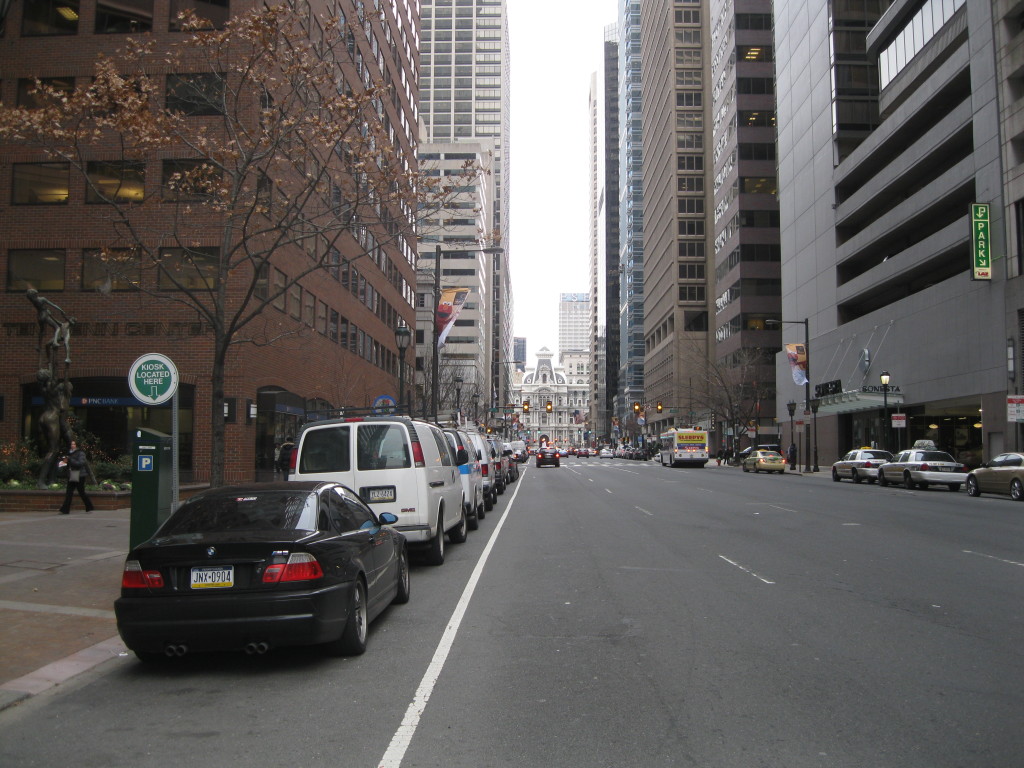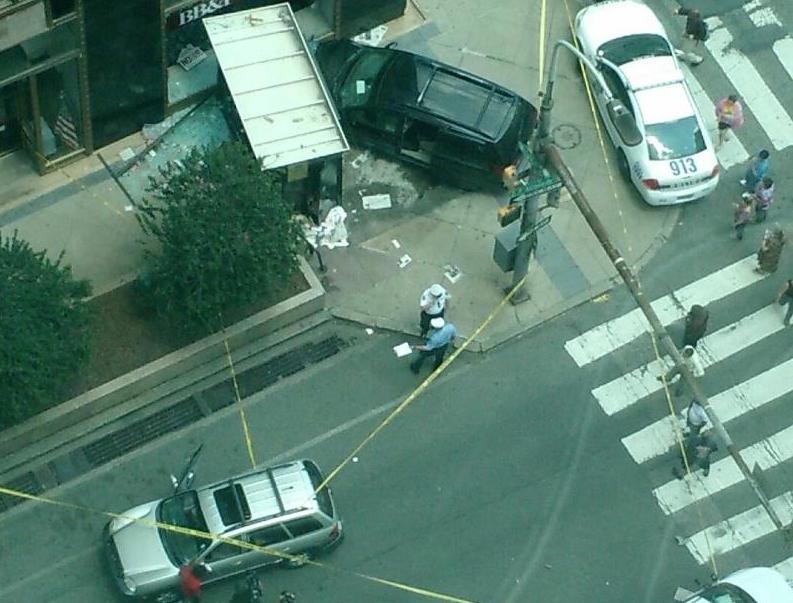
Photo via Martin Kelley on Facebook
The idea of putting in bike lanes on JFK and Market Streets began in 2009, when Center City District conducted a survey of property owners and managers on the two streets asking them how they could be enhanced.
One of the findings was that building owners and managers wanted better access to bike parking, bike storage and safer bicycling facilities and beautification of the streets for their employees.
As a result, Center City District commissioned a traffic study to recommend options for improving the streets for pedestrians and bicyclists. The report, which recommended a complete streets treatment, was presented to the property owners of major buildings and parking operators.
Property owners were enthusiastic, but the residents of the 1900 block of JFK Blvd. were less so.
In 2011, the Streets Department conducted a “capacity study” by placing barrels on the left hand travel lane to test the loss of one lane. Community meetings, business, and residential meetings were also held, but Council support could not be secured.

North side of Philadelphia’s Market Street before the bike lane installations.
In 2013, the Nutter Administration secured a grant to prepare a conceptual design. There were several options considered, including a buffered bike lane against the parking lane and a fully protected bike lane.
The Bicycle Coalition insisted that a protected bike lane was the only one that made sense for these two streets. This would have involved getting rid of a lane of traffic and moving over parking.
Unfortunately, the political support was not there for any proposal to remove a travel lane, with nay-sayers citing traffic problems if the lanes were installed.
And yet, the Bicycle Coalition continued meetings in City Hall and the Municipal Services Building, strategizing for these new bike lanes.

One potential idea for JFK and Market
In 2015, it was announced that the Democratic National Convention would be happening in Philadelphia, and the Bicycle Coalition re-ignited support for the lane. Because so many people would be in Philadelphia for the week, we noted, the city should provide them—and the rest of us, who live in the city—an easy, safe path from 30th Street Station to the Wells Fargo Center. And then make it permanent.
The plan also involved getting the 15th and 13th Street “Super Sharrows” installed from Center City to South Philly, and a sidepath from Oregon Ave. to the Navy Yard.
Center City District hired Parsons Brinkerhoff (now WSP) to prepare pavement marking plans and continued to lobby the Nutter Administration and Council for a way forward.
But, the lane was not considered by City Council at that time. Not even for a pilot.
The DNC came and went. National reporters mocked the city for its awful traffic, and the Democrats lost the presidential election.
The Bicycle Coalition persisted. In 2016, we began holding what we dubbed our “Bike Lane Toolkit” meetings with City Council members. In those meetings, we brought in as many constituents as could make it to meet with their district councilperson, and explained the need for better infrastructure in the district.
In the District 5 meeting with Councilman Clarke’s staff, we specifically noted these JFK and Market bike lanes were past due. The wide streets were conducive for speeding, and many pedestrians could not get from side to side in enough time with the light signal being as short as it is.

Our group meeting with Councilman Clarke’s staff in 2016
Bicycle Coalition policy coordinator Bob Previdi began to visit the apartment buildings on JFK Blvd. during this time. He continually heard from building residents that they were opposed to bike lanes on their streets, due to bad cyclist behavior and other factors.
We visited Center City Residents Association and Logan Square Neighborhood Association to present a “case for traffic calming on JFK and Market Streets.” This effort was done to keep the topic alive and determine the level of support and opposition. Both civic associations were open to the idea.
All of these meetings were both instructive and constructive. Another year would go by, and we continued advocating in City Hall, in the apartment buildings, and on the street, speaking with citizens about the traffic on JFK and Market, asking what they believed could be done.
That’s when tragedy struck.
In a cruel irony, in the summer of 2017, transportation advocate Peter Javsicas was killed by an out-of-control motorist while walking on the sidewalk at 16th and JFK.

The scene of the crash at 16th and JFK on June 13, 2017
The Bicycle Coalition would hold a walk for Javsicas, through Center City, ending at City Hall and demanding action from City Council.
We put together an email petition and hundreds of you responded, sending personal messages to Councilman Darrell Clarke, and demanding a safer JFK Boulevard.
Clarke responded that day, saying he would hold Vision Zero hearings.
Two weeks later, we were out again on JFK Boulevard, speaking to folks about their thoughts on what could make JFK and Market Streets safer via an intercept survey. The city’s Vision Zero Action Plan had shown, officially, that Market Street is one of Philadelphia’s most dangerous streets, and something had to be done.
Our volunteers—Gretchen Alexander, Kyle Hearing, Kaeka Williams, Ricky Hunt, Nick Rogers, Devon Delvecchio—spoke to 140 people over two days, asking them a list of questions about safety on the Center City Streets.
An overwhelming majority of those they spoke with were in favor of traffic calming on JFK and Market.
For the 2017 Park(ing) Day, the Bicycle Coalition staked out a space on JFK Boulevard, answering questions about what a protected bike lane would look like there.

Bike Coalition takes up a Park(ing) space
Of course, internal conversations continued. The Bicycle Coalition spoke many times with the Office of Transportation and Infrastructure Systems about pilot bike lanes on those streets in Center City, and what they’d look like.
In October, the Central City District conducted a survey of employees working in JFK and Market office buildings.
The Bicycle Coalition delivered postcards with a link to the survey to street level stores and garages for placement on car windshields. In October, Center City District released the results of its Survey.
Meanwhile, OTIS began quietly holding official meetings at the apartment buildings along JFK and Market Streets, speaking to those who worked and lived along the street about what could be done to make it safer.
Business owners along the corridors spoke to OTIS about the potential for parking-protected bike lanes there, too. In February and March, CCRA and Logan Square Neighborhood Association received presentations from OTIS and gave a green light to a nine month pilot project for Street calming and complete streets with a parking-protected bike lane.
On March 17, 2018, Mayor Jim Kenney spoke at the Bicycle Coalition’s Vision Zero Conference. The first thing he did was announce a new bike lane project on JFK and Market Streets.

The announcement was the culmination of eight years of advocacy by the Bicycle Coalition, engineering and design work by consultants hired by Center City District and the Nutter and Kenney Administrations, considerable outreach by OTIS during Fall 2017 and Winter 2018, and all of the people who responded to surveys and action alerts, calling for this common-sense complete streets solution for JFK and Market Streets.
These new bike lanes will not only help cyclists commute to their jobs, school, or wherever they need to go in Center City, but will also help calm traffic and create a shorter crossing distance for pedestrians getting across the street.
On May 18, the city announced construction on the bike lanes would begin, and it’s been ongoing since.
Advocacy is a long, hard road. We are happy to see the JFK and Market Street protected bike lanes come to fruition, and will continue to advocate for better, safer streets for all road users.

Thank you for all your persistent advocacy. We are grateful for the BCGP and appreciate everything you have done to make our city safer.
A long process; took determination and stamina. Many thanks for your advocacy.
The Concept of Buffer Bike lanes on JFK and Market came out of the Streets Department. It was after a CCD Study to determine if These two streets could be made two way. CCD funded a Capacity Study of these two streets. to see if they could be converted to two way. The study showed they could not but also showed extra capacity that allowed a road diet that would allow the buffer (converted to Protected latter) could be implemented. This Occurred in Early 2009 or late 2008 and prior to the Survey conducted by CCD.